Ethical Considerations in Death and Dying: A Healthcare Perspective
VerifiedAdded on 2020/10/22
|10
|3751
|336
Essay
AI Summary
This essay delves into the critical aspects of medical ethics concerning death and dying within the healthcare sector. It explores the significance of ethical considerations in end-of-life care, emphasizing the importance of ethical principles for medical professionals. The study examines the ethical dilemmas that arise, such as the 'right to die and duty to tell the truth,' and miscommunication, highlighting the conflicts between ethical standards. The core of the essay focuses on Beauchamp and Childress's four principles of biomedical ethics: autonomy, beneficence, non-maleficence, and justice. It analyzes these principles through real-world case studies, such as Maisie, Dennis, Ms. B, and Sandra, to illustrate the conflicts that can occur when caring for dying individuals. The essay discusses how these principles can create conflict, particularly regarding patient autonomy versus the duty to prevent harm, and the challenges medical professionals face in balancing these principles. It underscores the importance of ethical knowledge and appropriate medical procedures in providing end-of-life care, emphasizing the need for healthcare representatives to have a thorough understanding of ethical issues. Furthermore, the essay touches upon ethical issues such as withdrawing and withholding interventions and medical futility.
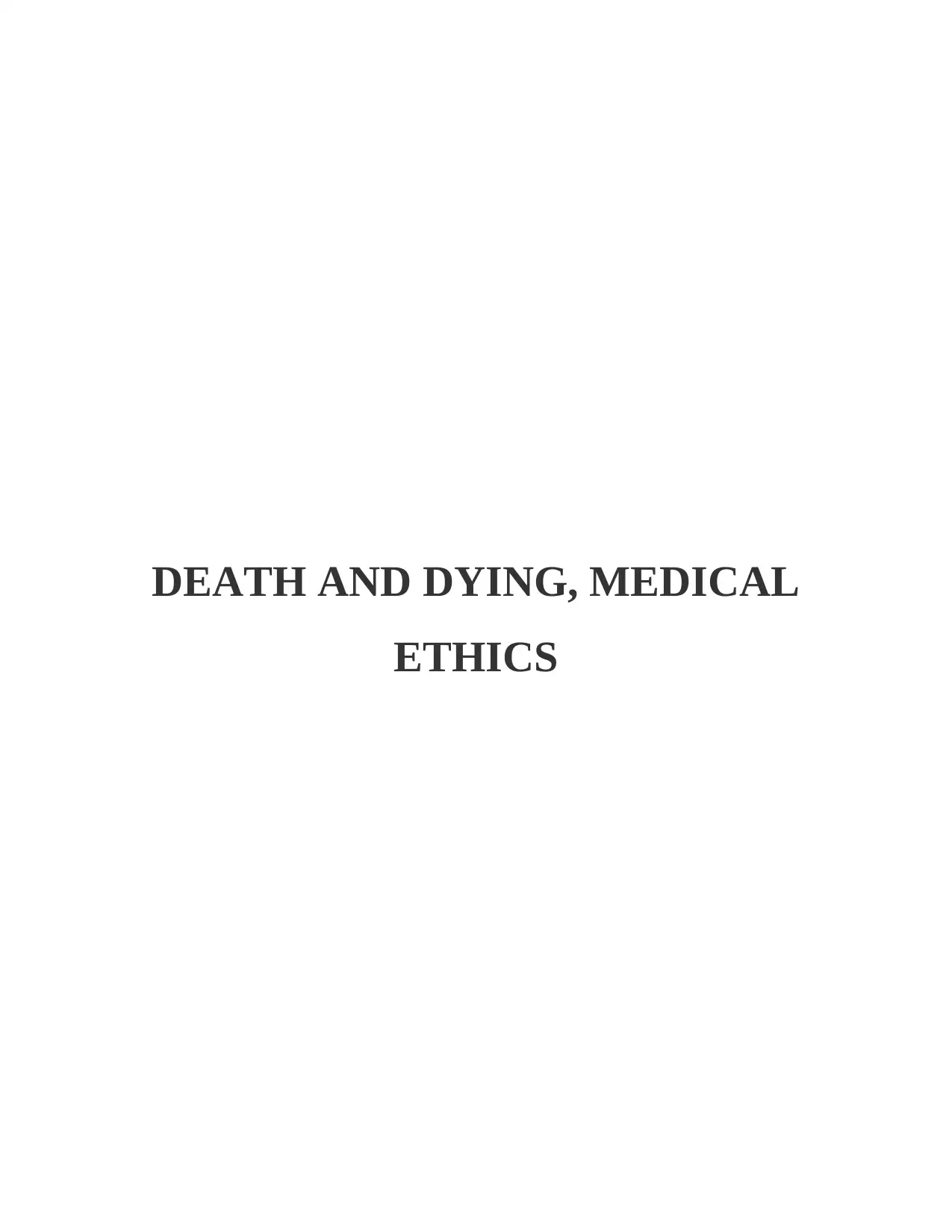
DEATH AND DYING, MEDICAL
ETHICS
ETHICS
Paraphrase This Document
Need a fresh take? Get an instant paraphrase of this document with our AI Paraphraser
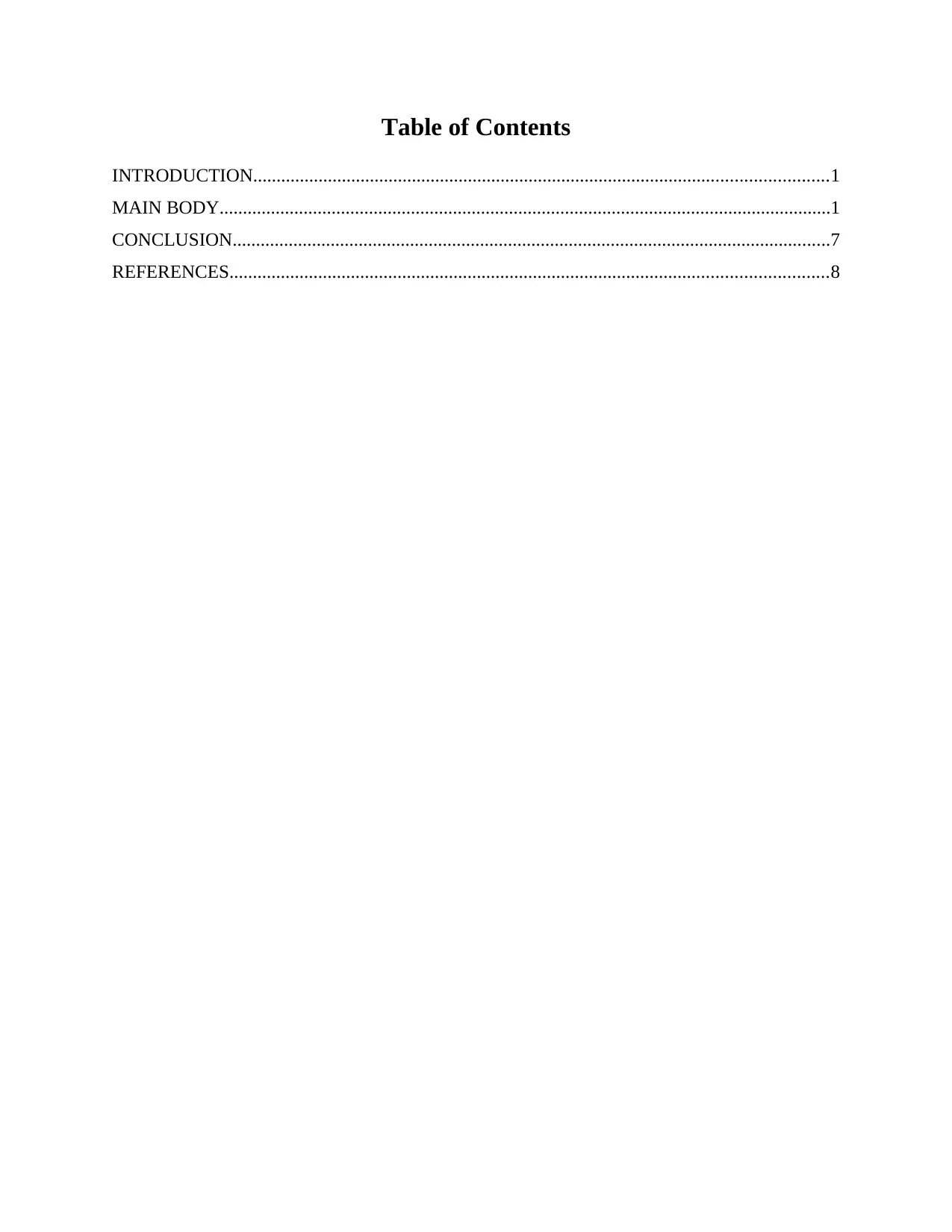
Table of Contents
INTRODUCTION...........................................................................................................................1
MAIN BODY...................................................................................................................................1
CONCLUSION................................................................................................................................7
REFERENCES................................................................................................................................8
INTRODUCTION...........................................................................................................................1
MAIN BODY...................................................................................................................................1
CONCLUSION................................................................................................................................7
REFERENCES................................................................................................................................8
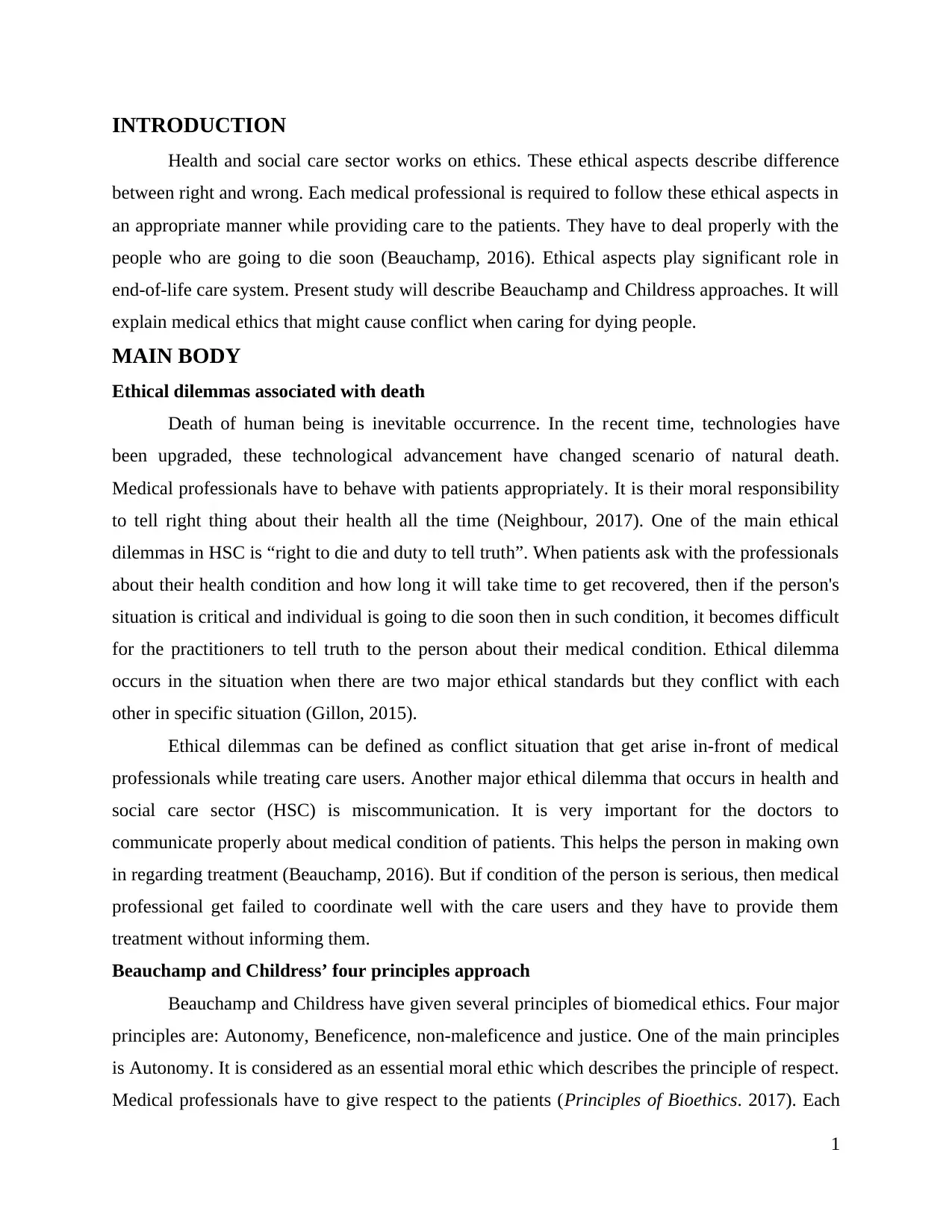
INTRODUCTION
Health and social care sector works on ethics. These ethical aspects describe difference
between right and wrong. Each medical professional is required to follow these ethical aspects in
an appropriate manner while providing care to the patients. They have to deal properly with the
people who are going to die soon (Beauchamp, 2016). Ethical aspects play significant role in
end-of-life care system. Present study will describe Beauchamp and Childress approaches. It will
explain medical ethics that might cause conflict when caring for dying people.
MAIN BODY
Ethical dilemmas associated with death
Death of human being is inevitable occurrence. In the recent time, technologies have
been upgraded, these technological advancement have changed scenario of natural death.
Medical professionals have to behave with patients appropriately. It is their moral responsibility
to tell right thing about their health all the time (Neighbour, 2017). One of the main ethical
dilemmas in HSC is “right to die and duty to tell truth”. When patients ask with the professionals
about their health condition and how long it will take time to get recovered, then if the person's
situation is critical and individual is going to die soon then in such condition, it becomes difficult
for the practitioners to tell truth to the person about their medical condition. Ethical dilemma
occurs in the situation when there are two major ethical standards but they conflict with each
other in specific situation (Gillon, 2015).
Ethical dilemmas can be defined as conflict situation that get arise in-front of medical
professionals while treating care users. Another major ethical dilemma that occurs in health and
social care sector (HSC) is miscommunication. It is very important for the doctors to
communicate properly about medical condition of patients. This helps the person in making own
in regarding treatment (Beauchamp, 2016). But if condition of the person is serious, then medical
professional get failed to coordinate well with the care users and they have to provide them
treatment without informing them.
Beauchamp and Childress’ four principles approach
Beauchamp and Childress have given several principles of biomedical ethics. Four major
principles are: Autonomy, Beneficence, non-maleficence and justice. One of the main principles
is Autonomy. It is considered as an essential moral ethic which describes the principle of respect.
Medical professionals have to give respect to the patients (Principles of Bioethics. 2017). Each
1
Health and social care sector works on ethics. These ethical aspects describe difference
between right and wrong. Each medical professional is required to follow these ethical aspects in
an appropriate manner while providing care to the patients. They have to deal properly with the
people who are going to die soon (Beauchamp, 2016). Ethical aspects play significant role in
end-of-life care system. Present study will describe Beauchamp and Childress approaches. It will
explain medical ethics that might cause conflict when caring for dying people.
MAIN BODY
Ethical dilemmas associated with death
Death of human being is inevitable occurrence. In the recent time, technologies have
been upgraded, these technological advancement have changed scenario of natural death.
Medical professionals have to behave with patients appropriately. It is their moral responsibility
to tell right thing about their health all the time (Neighbour, 2017). One of the main ethical
dilemmas in HSC is “right to die and duty to tell truth”. When patients ask with the professionals
about their health condition and how long it will take time to get recovered, then if the person's
situation is critical and individual is going to die soon then in such condition, it becomes difficult
for the practitioners to tell truth to the person about their medical condition. Ethical dilemma
occurs in the situation when there are two major ethical standards but they conflict with each
other in specific situation (Gillon, 2015).
Ethical dilemmas can be defined as conflict situation that get arise in-front of medical
professionals while treating care users. Another major ethical dilemma that occurs in health and
social care sector (HSC) is miscommunication. It is very important for the doctors to
communicate properly about medical condition of patients. This helps the person in making own
in regarding treatment (Beauchamp, 2016). But if condition of the person is serious, then medical
professional get failed to coordinate well with the care users and they have to provide them
treatment without informing them.
Beauchamp and Childress’ four principles approach
Beauchamp and Childress have given several principles of biomedical ethics. Four major
principles are: Autonomy, Beneficence, non-maleficence and justice. One of the main principles
is Autonomy. It is considered as an essential moral ethic which describes the principle of respect.
Medical professionals have to give respect to the patients (Principles of Bioethics. 2017). Each
1
⊘ This is a preview!⊘
Do you want full access?
Subscribe today to unlock all pages.

Trusted by 1+ million students worldwide
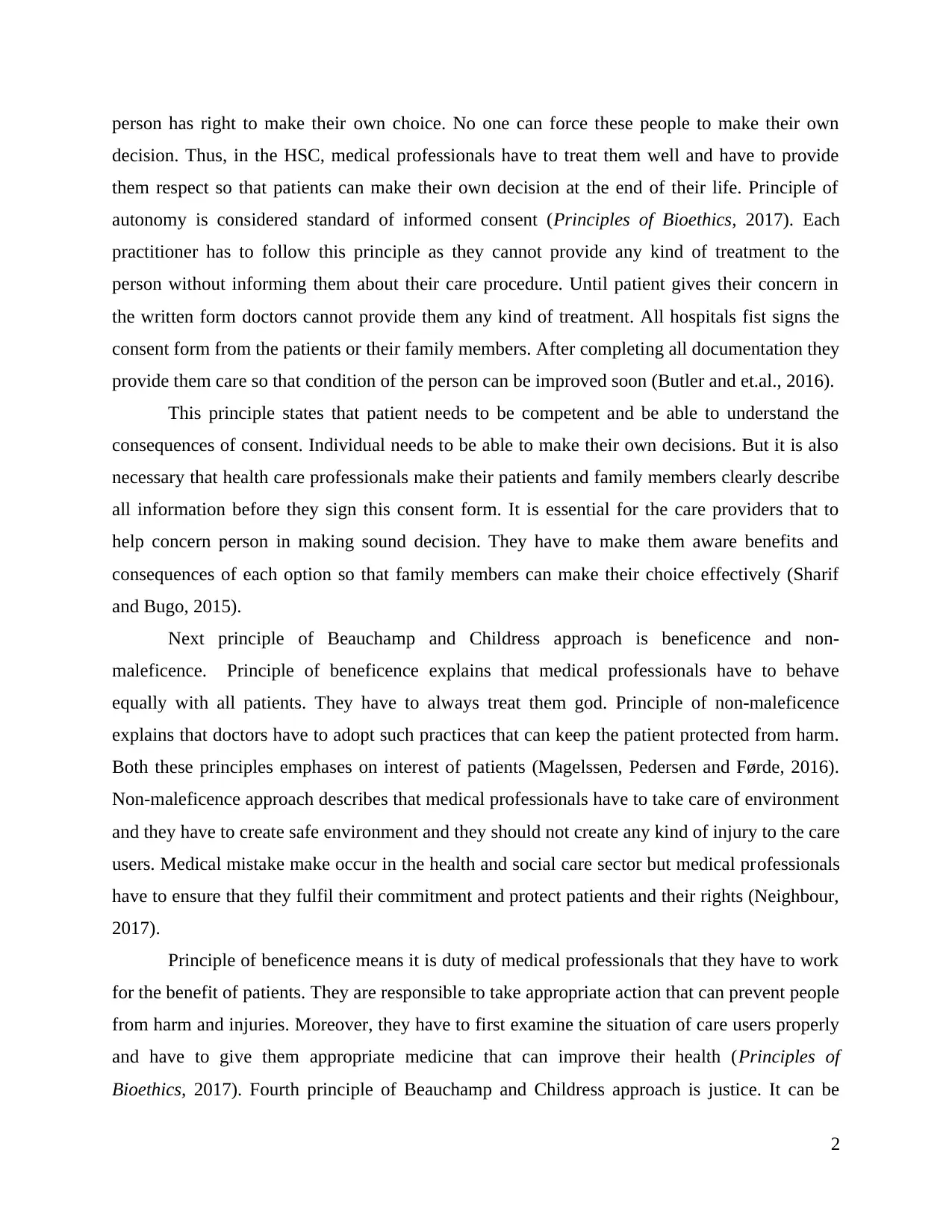
person has right to make their own choice. No one can force these people to make their own
decision. Thus, in the HSC, medical professionals have to treat them well and have to provide
them respect so that patients can make their own decision at the end of their life. Principle of
autonomy is considered standard of informed consent (Principles of Bioethics, 2017). Each
practitioner has to follow this principle as they cannot provide any kind of treatment to the
person without informing them about their care procedure. Until patient gives their concern in
the written form doctors cannot provide them any kind of treatment. All hospitals fist signs the
consent form from the patients or their family members. After completing all documentation they
provide them care so that condition of the person can be improved soon (Butler and et.al., 2016).
This principle states that patient needs to be competent and be able to understand the
consequences of consent. Individual needs to be able to make their own decisions. But it is also
necessary that health care professionals make their patients and family members clearly describe
all information before they sign this consent form. It is essential for the care providers that to
help concern person in making sound decision. They have to make them aware benefits and
consequences of each option so that family members can make their choice effectively (Sharif
and Bugo, 2015).
Next principle of Beauchamp and Childress approach is beneficence and non-
maleficence. Principle of beneficence explains that medical professionals have to behave
equally with all patients. They have to always treat them god. Principle of non-maleficence
explains that doctors have to adopt such practices that can keep the patient protected from harm.
Both these principles emphases on interest of patients (Magelssen, Pedersen and Førde, 2016).
Non-maleficence approach describes that medical professionals have to take care of environment
and they have to create safe environment and they should not create any kind of injury to the care
users. Medical mistake make occur in the health and social care sector but medical professionals
have to ensure that they fulfil their commitment and protect patients and their rights (Neighbour,
2017).
Principle of beneficence means it is duty of medical professionals that they have to work
for the benefit of patients. They are responsible to take appropriate action that can prevent people
from harm and injuries. Moreover, they have to first examine the situation of care users properly
and have to give them appropriate medicine that can improve their health (Principles of
Bioethics, 2017). Fourth principle of Beauchamp and Childress approach is justice. It can be
2
decision. Thus, in the HSC, medical professionals have to treat them well and have to provide
them respect so that patients can make their own decision at the end of their life. Principle of
autonomy is considered standard of informed consent (Principles of Bioethics, 2017). Each
practitioner has to follow this principle as they cannot provide any kind of treatment to the
person without informing them about their care procedure. Until patient gives their concern in
the written form doctors cannot provide them any kind of treatment. All hospitals fist signs the
consent form from the patients or their family members. After completing all documentation they
provide them care so that condition of the person can be improved soon (Butler and et.al., 2016).
This principle states that patient needs to be competent and be able to understand the
consequences of consent. Individual needs to be able to make their own decisions. But it is also
necessary that health care professionals make their patients and family members clearly describe
all information before they sign this consent form. It is essential for the care providers that to
help concern person in making sound decision. They have to make them aware benefits and
consequences of each option so that family members can make their choice effectively (Sharif
and Bugo, 2015).
Next principle of Beauchamp and Childress approach is beneficence and non-
maleficence. Principle of beneficence explains that medical professionals have to behave
equally with all patients. They have to always treat them god. Principle of non-maleficence
explains that doctors have to adopt such practices that can keep the patient protected from harm.
Both these principles emphases on interest of patients (Magelssen, Pedersen and Førde, 2016).
Non-maleficence approach describes that medical professionals have to take care of environment
and they have to create safe environment and they should not create any kind of injury to the care
users. Medical mistake make occur in the health and social care sector but medical professionals
have to ensure that they fulfil their commitment and protect patients and their rights (Neighbour,
2017).
Principle of beneficence means it is duty of medical professionals that they have to work
for the benefit of patients. They are responsible to take appropriate action that can prevent people
from harm and injuries. Moreover, they have to first examine the situation of care users properly
and have to give them appropriate medicine that can improve their health (Principles of
Bioethics, 2017). Fourth principle of Beauchamp and Childress approach is justice. It can be
2
Paraphrase This Document
Need a fresh take? Get an instant paraphrase of this document with our AI Paraphraser
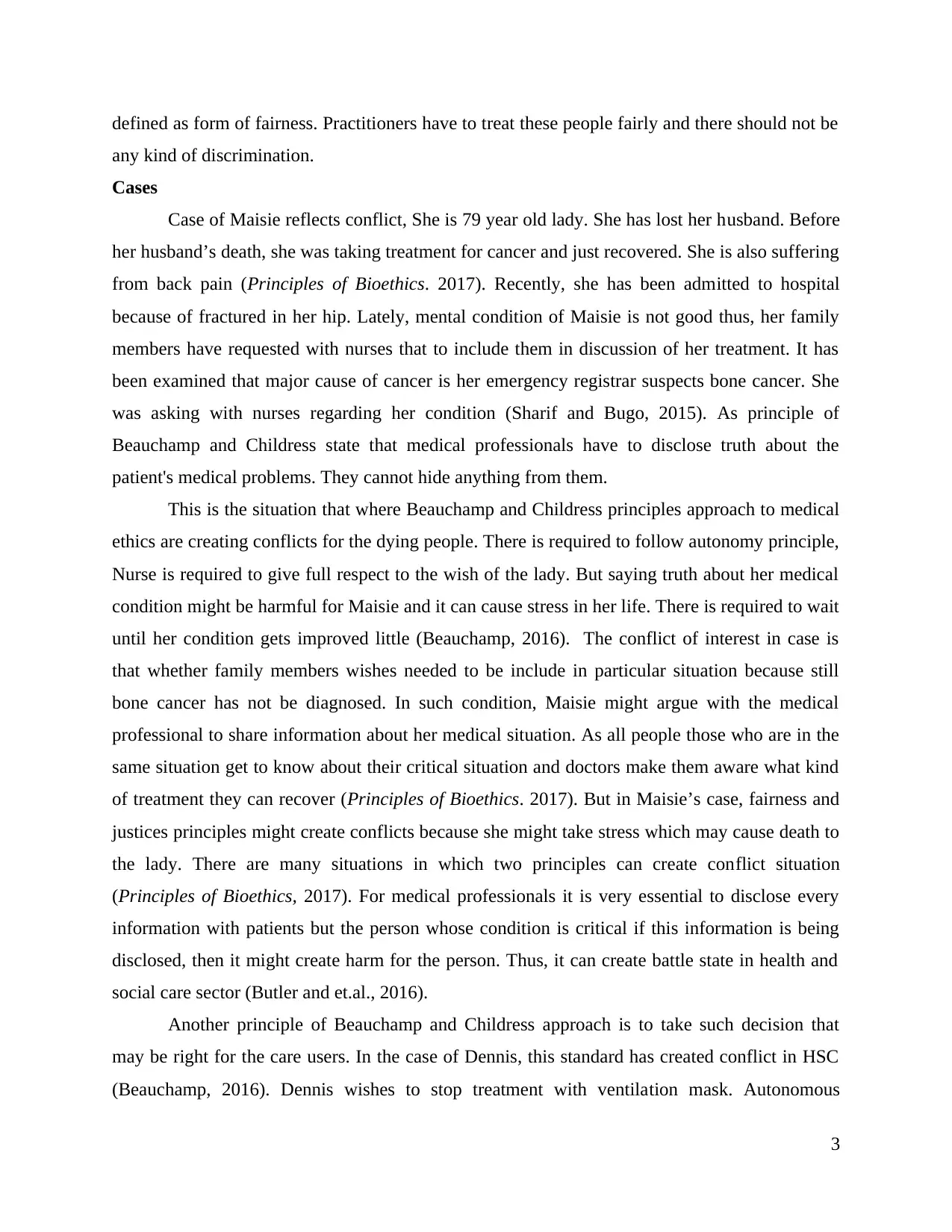
defined as form of fairness. Practitioners have to treat these people fairly and there should not be
any kind of discrimination.
Cases
Case of Maisie reflects conflict, She is 79 year old lady. She has lost her husband. Before
her husband’s death, she was taking treatment for cancer and just recovered. She is also suffering
from back pain (Principles of Bioethics. 2017). Recently, she has been admitted to hospital
because of fractured in her hip. Lately, mental condition of Maisie is not good thus, her family
members have requested with nurses that to include them in discussion of her treatment. It has
been examined that major cause of cancer is her emergency registrar suspects bone cancer. She
was asking with nurses regarding her condition (Sharif and Bugo, 2015). As principle of
Beauchamp and Childress state that medical professionals have to disclose truth about the
patient's medical problems. They cannot hide anything from them.
This is the situation that where Beauchamp and Childress principles approach to medical
ethics are creating conflicts for the dying people. There is required to follow autonomy principle,
Nurse is required to give full respect to the wish of the lady. But saying truth about her medical
condition might be harmful for Maisie and it can cause stress in her life. There is required to wait
until her condition gets improved little (Beauchamp, 2016). The conflict of interest in case is
that whether family members wishes needed to be include in particular situation because still
bone cancer has not be diagnosed. In such condition, Maisie might argue with the medical
professional to share information about her medical situation. As all people those who are in the
same situation get to know about their critical situation and doctors make them aware what kind
of treatment they can recover (Principles of Bioethics. 2017). But in Maisie’s case, fairness and
justices principles might create conflicts because she might take stress which may cause death to
the lady. There are many situations in which two principles can create conflict situation
(Principles of Bioethics, 2017). For medical professionals it is very essential to disclose every
information with patients but the person whose condition is critical if this information is being
disclosed, then it might create harm for the person. Thus, it can create battle state in health and
social care sector (Butler and et.al., 2016).
Another principle of Beauchamp and Childress approach is to take such decision that
may be right for the care users. In the case of Dennis, this standard has created conflict in HSC
(Beauchamp, 2016). Dennis wishes to stop treatment with ventilation mask. Autonomous
3
any kind of discrimination.
Cases
Case of Maisie reflects conflict, She is 79 year old lady. She has lost her husband. Before
her husband’s death, she was taking treatment for cancer and just recovered. She is also suffering
from back pain (Principles of Bioethics. 2017). Recently, she has been admitted to hospital
because of fractured in her hip. Lately, mental condition of Maisie is not good thus, her family
members have requested with nurses that to include them in discussion of her treatment. It has
been examined that major cause of cancer is her emergency registrar suspects bone cancer. She
was asking with nurses regarding her condition (Sharif and Bugo, 2015). As principle of
Beauchamp and Childress state that medical professionals have to disclose truth about the
patient's medical problems. They cannot hide anything from them.
This is the situation that where Beauchamp and Childress principles approach to medical
ethics are creating conflicts for the dying people. There is required to follow autonomy principle,
Nurse is required to give full respect to the wish of the lady. But saying truth about her medical
condition might be harmful for Maisie and it can cause stress in her life. There is required to wait
until her condition gets improved little (Beauchamp, 2016). The conflict of interest in case is
that whether family members wishes needed to be include in particular situation because still
bone cancer has not be diagnosed. In such condition, Maisie might argue with the medical
professional to share information about her medical situation. As all people those who are in the
same situation get to know about their critical situation and doctors make them aware what kind
of treatment they can recover (Principles of Bioethics. 2017). But in Maisie’s case, fairness and
justices principles might create conflicts because she might take stress which may cause death to
the lady. There are many situations in which two principles can create conflict situation
(Principles of Bioethics, 2017). For medical professionals it is very essential to disclose every
information with patients but the person whose condition is critical if this information is being
disclosed, then it might create harm for the person. Thus, it can create battle state in health and
social care sector (Butler and et.al., 2016).
Another principle of Beauchamp and Childress approach is to take such decision that
may be right for the care users. In the case of Dennis, this standard has created conflict in HSC
(Beauchamp, 2016). Dennis wishes to stop treatment with ventilation mask. Autonomous
3
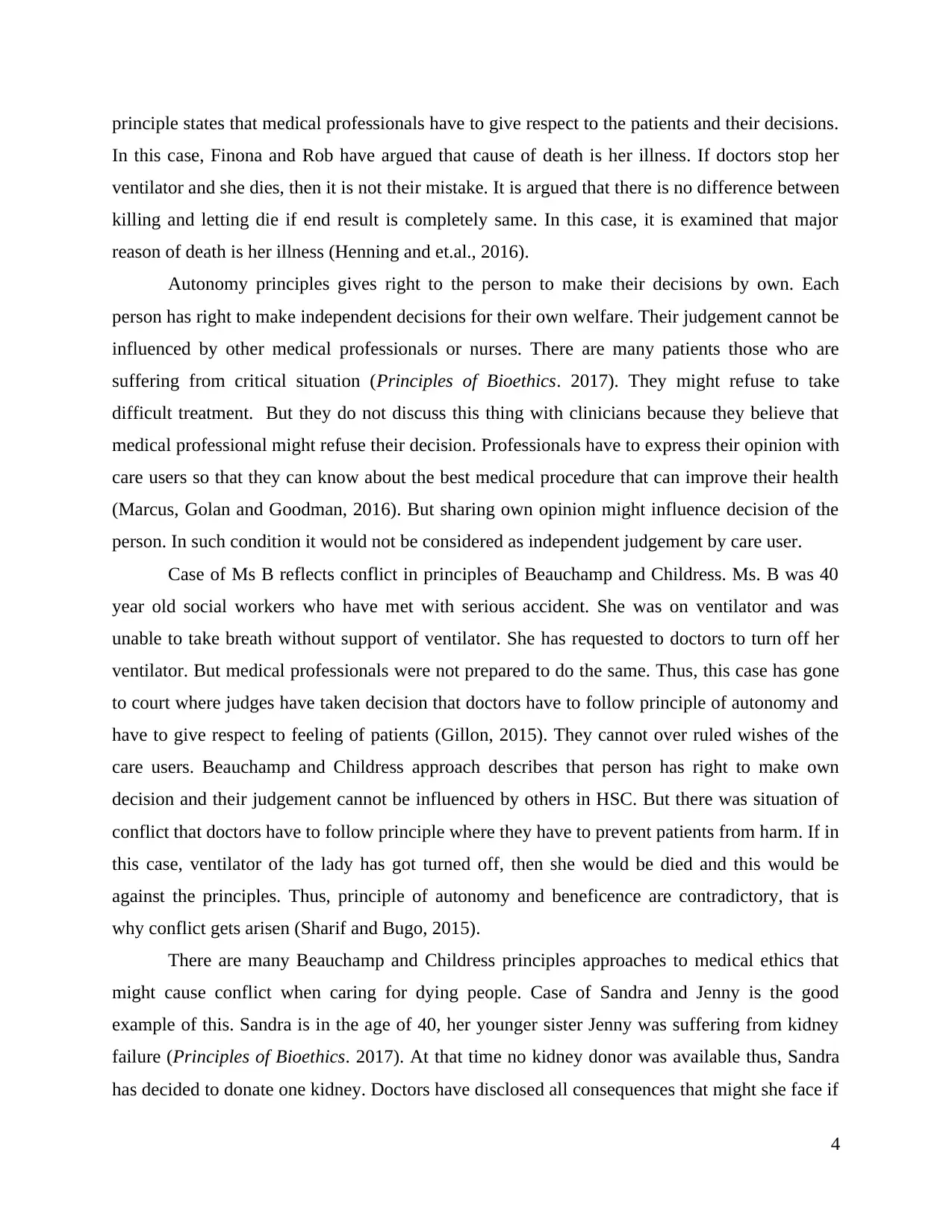
principle states that medical professionals have to give respect to the patients and their decisions.
In this case, Finona and Rob have argued that cause of death is her illness. If doctors stop her
ventilator and she dies, then it is not their mistake. It is argued that there is no difference between
killing and letting die if end result is completely same. In this case, it is examined that major
reason of death is her illness (Henning and et.al., 2016).
Autonomy principles gives right to the person to make their decisions by own. Each
person has right to make independent decisions for their own welfare. Their judgement cannot be
influenced by other medical professionals or nurses. There are many patients those who are
suffering from critical situation (Principles of Bioethics. 2017). They might refuse to take
difficult treatment. But they do not discuss this thing with clinicians because they believe that
medical professional might refuse their decision. Professionals have to express their opinion with
care users so that they can know about the best medical procedure that can improve their health
(Marcus, Golan and Goodman, 2016). But sharing own opinion might influence decision of the
person. In such condition it would not be considered as independent judgement by care user.
Case of Ms B reflects conflict in principles of Beauchamp and Childress. Ms. B was 40
year old social workers who have met with serious accident. She was on ventilator and was
unable to take breath without support of ventilator. She has requested to doctors to turn off her
ventilator. But medical professionals were not prepared to do the same. Thus, this case has gone
to court where judges have taken decision that doctors have to follow principle of autonomy and
have to give respect to feeling of patients (Gillon, 2015). They cannot over ruled wishes of the
care users. Beauchamp and Childress approach describes that person has right to make own
decision and their judgement cannot be influenced by others in HSC. But there was situation of
conflict that doctors have to follow principle where they have to prevent patients from harm. If in
this case, ventilator of the lady has got turned off, then she would be died and this would be
against the principles. Thus, principle of autonomy and beneficence are contradictory, that is
why conflict gets arisen (Sharif and Bugo, 2015).
There are many Beauchamp and Childress principles approaches to medical ethics that
might cause conflict when caring for dying people. Case of Sandra and Jenny is the good
example of this. Sandra is in the age of 40, her younger sister Jenny was suffering from kidney
failure (Principles of Bioethics. 2017). At that time no kidney donor was available thus, Sandra
has decided to donate one kidney. Doctors have disclosed all consequences that might she face if
4
In this case, Finona and Rob have argued that cause of death is her illness. If doctors stop her
ventilator and she dies, then it is not their mistake. It is argued that there is no difference between
killing and letting die if end result is completely same. In this case, it is examined that major
reason of death is her illness (Henning and et.al., 2016).
Autonomy principles gives right to the person to make their decisions by own. Each
person has right to make independent decisions for their own welfare. Their judgement cannot be
influenced by other medical professionals or nurses. There are many patients those who are
suffering from critical situation (Principles of Bioethics. 2017). They might refuse to take
difficult treatment. But they do not discuss this thing with clinicians because they believe that
medical professional might refuse their decision. Professionals have to express their opinion with
care users so that they can know about the best medical procedure that can improve their health
(Marcus, Golan and Goodman, 2016). But sharing own opinion might influence decision of the
person. In such condition it would not be considered as independent judgement by care user.
Case of Ms B reflects conflict in principles of Beauchamp and Childress. Ms. B was 40
year old social workers who have met with serious accident. She was on ventilator and was
unable to take breath without support of ventilator. She has requested to doctors to turn off her
ventilator. But medical professionals were not prepared to do the same. Thus, this case has gone
to court where judges have taken decision that doctors have to follow principle of autonomy and
have to give respect to feeling of patients (Gillon, 2015). They cannot over ruled wishes of the
care users. Beauchamp and Childress approach describes that person has right to make own
decision and their judgement cannot be influenced by others in HSC. But there was situation of
conflict that doctors have to follow principle where they have to prevent patients from harm. If in
this case, ventilator of the lady has got turned off, then she would be died and this would be
against the principles. Thus, principle of autonomy and beneficence are contradictory, that is
why conflict gets arisen (Sharif and Bugo, 2015).
There are many Beauchamp and Childress principles approaches to medical ethics that
might cause conflict when caring for dying people. Case of Sandra and Jenny is the good
example of this. Sandra is in the age of 40, her younger sister Jenny was suffering from kidney
failure (Principles of Bioethics. 2017). At that time no kidney donor was available thus, Sandra
has decided to donate one kidney. Doctors have disclosed all consequences that might she face if
4
⊘ This is a preview!⊘
Do you want full access?
Subscribe today to unlock all pages.

Trusted by 1+ million students worldwide
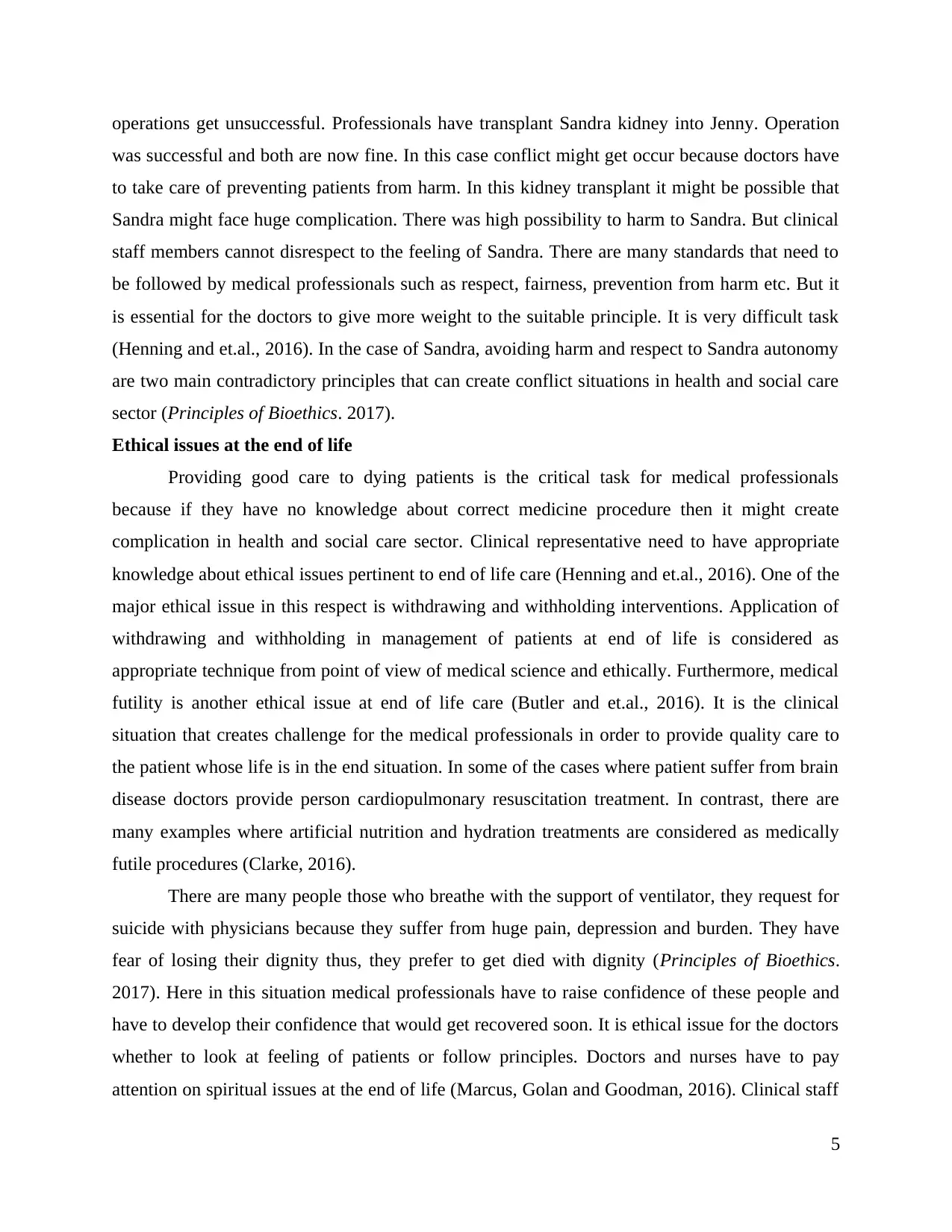
operations get unsuccessful. Professionals have transplant Sandra kidney into Jenny. Operation
was successful and both are now fine. In this case conflict might get occur because doctors have
to take care of preventing patients from harm. In this kidney transplant it might be possible that
Sandra might face huge complication. There was high possibility to harm to Sandra. But clinical
staff members cannot disrespect to the feeling of Sandra. There are many standards that need to
be followed by medical professionals such as respect, fairness, prevention from harm etc. But it
is essential for the doctors to give more weight to the suitable principle. It is very difficult task
(Henning and et.al., 2016). In the case of Sandra, avoiding harm and respect to Sandra autonomy
are two main contradictory principles that can create conflict situations in health and social care
sector (Principles of Bioethics. 2017).
Ethical issues at the end of life
Providing good care to dying patients is the critical task for medical professionals
because if they have no knowledge about correct medicine procedure then it might create
complication in health and social care sector. Clinical representative need to have appropriate
knowledge about ethical issues pertinent to end of life care (Henning and et.al., 2016). One of the
major ethical issue in this respect is withdrawing and withholding interventions. Application of
withdrawing and withholding in management of patients at end of life is considered as
appropriate technique from point of view of medical science and ethically. Furthermore, medical
futility is another ethical issue at end of life care (Butler and et.al., 2016). It is the clinical
situation that creates challenge for the medical professionals in order to provide quality care to
the patient whose life is in the end situation. In some of the cases where patient suffer from brain
disease doctors provide person cardiopulmonary resuscitation treatment. In contrast, there are
many examples where artificial nutrition and hydration treatments are considered as medically
futile procedures (Clarke, 2016).
There are many people those who breathe with the support of ventilator, they request for
suicide with physicians because they suffer from huge pain, depression and burden. They have
fear of losing their dignity thus, they prefer to get died with dignity (Principles of Bioethics.
2017). Here in this situation medical professionals have to raise confidence of these people and
have to develop their confidence that would get recovered soon. It is ethical issue for the doctors
whether to look at feeling of patients or follow principles. Doctors and nurses have to pay
attention on spiritual issues at the end of life (Marcus, Golan and Goodman, 2016). Clinical staff
5
was successful and both are now fine. In this case conflict might get occur because doctors have
to take care of preventing patients from harm. In this kidney transplant it might be possible that
Sandra might face huge complication. There was high possibility to harm to Sandra. But clinical
staff members cannot disrespect to the feeling of Sandra. There are many standards that need to
be followed by medical professionals such as respect, fairness, prevention from harm etc. But it
is essential for the doctors to give more weight to the suitable principle. It is very difficult task
(Henning and et.al., 2016). In the case of Sandra, avoiding harm and respect to Sandra autonomy
are two main contradictory principles that can create conflict situations in health and social care
sector (Principles of Bioethics. 2017).
Ethical issues at the end of life
Providing good care to dying patients is the critical task for medical professionals
because if they have no knowledge about correct medicine procedure then it might create
complication in health and social care sector. Clinical representative need to have appropriate
knowledge about ethical issues pertinent to end of life care (Henning and et.al., 2016). One of the
major ethical issue in this respect is withdrawing and withholding interventions. Application of
withdrawing and withholding in management of patients at end of life is considered as
appropriate technique from point of view of medical science and ethically. Furthermore, medical
futility is another ethical issue at end of life care (Butler and et.al., 2016). It is the clinical
situation that creates challenge for the medical professionals in order to provide quality care to
the patient whose life is in the end situation. In some of the cases where patient suffer from brain
disease doctors provide person cardiopulmonary resuscitation treatment. In contrast, there are
many examples where artificial nutrition and hydration treatments are considered as medically
futile procedures (Clarke, 2016).
There are many people those who breathe with the support of ventilator, they request for
suicide with physicians because they suffer from huge pain, depression and burden. They have
fear of losing their dignity thus, they prefer to get died with dignity (Principles of Bioethics.
2017). Here in this situation medical professionals have to raise confidence of these people and
have to develop their confidence that would get recovered soon. It is ethical issue for the doctors
whether to look at feeling of patients or follow principles. Doctors and nurses have to pay
attention on spiritual issues at the end of life (Marcus, Golan and Goodman, 2016). Clinical staff
5
Paraphrase This Document
Need a fresh take? Get an instant paraphrase of this document with our AI Paraphraser
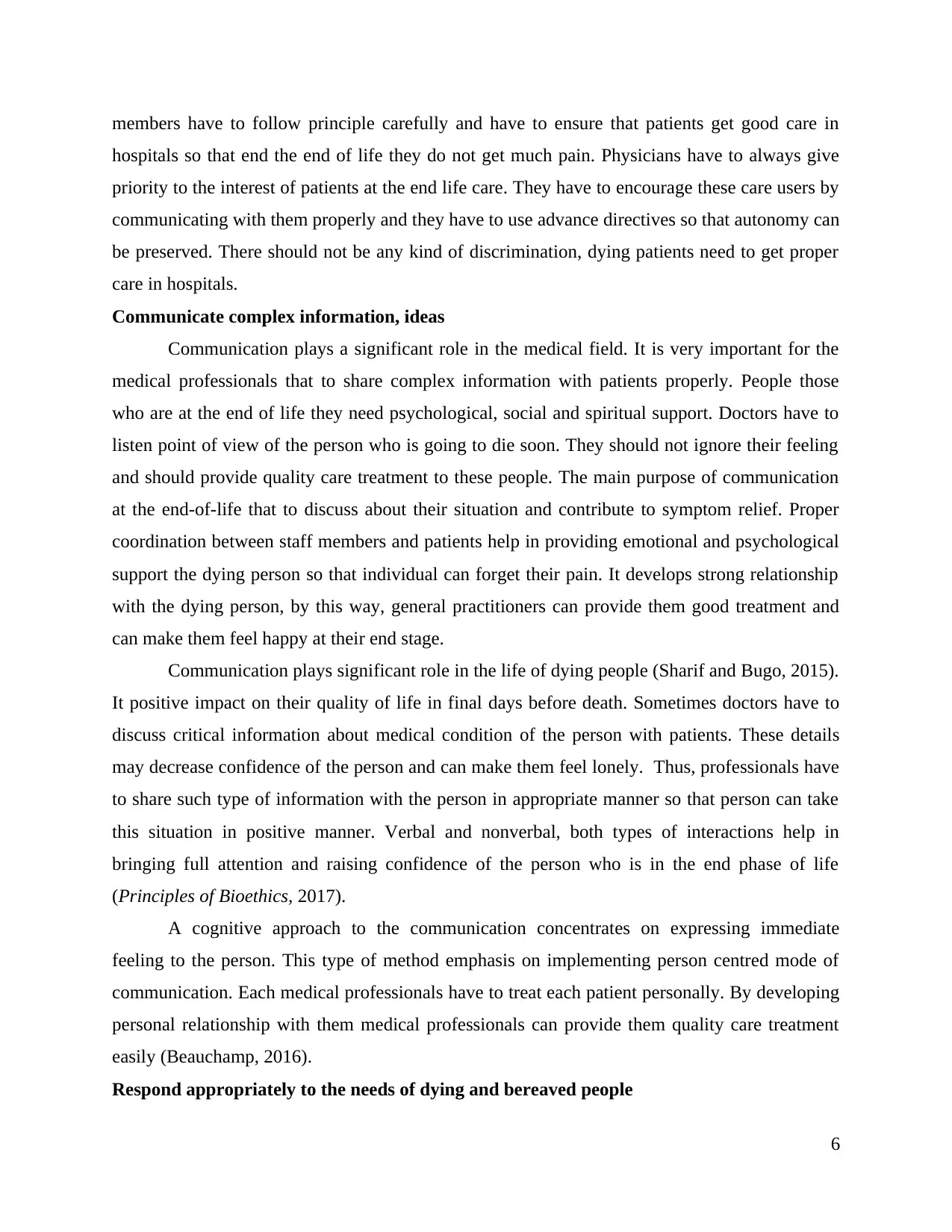
members have to follow principle carefully and have to ensure that patients get good care in
hospitals so that end the end of life they do not get much pain. Physicians have to always give
priority to the interest of patients at the end life care. They have to encourage these care users by
communicating with them properly and they have to use advance directives so that autonomy can
be preserved. There should not be any kind of discrimination, dying patients need to get proper
care in hospitals.
Communicate complex information, ideas
Communication plays a significant role in the medical field. It is very important for the
medical professionals that to share complex information with patients properly. People those
who are at the end of life they need psychological, social and spiritual support. Doctors have to
listen point of view of the person who is going to die soon. They should not ignore their feeling
and should provide quality care treatment to these people. The main purpose of communication
at the end-of-life that to discuss about their situation and contribute to symptom relief. Proper
coordination between staff members and patients help in providing emotional and psychological
support the dying person so that individual can forget their pain. It develops strong relationship
with the dying person, by this way, general practitioners can provide them good treatment and
can make them feel happy at their end stage.
Communication plays significant role in the life of dying people (Sharif and Bugo, 2015).
It positive impact on their quality of life in final days before death. Sometimes doctors have to
discuss critical information about medical condition of the person with patients. These details
may decrease confidence of the person and can make them feel lonely. Thus, professionals have
to share such type of information with the person in appropriate manner so that person can take
this situation in positive manner. Verbal and nonverbal, both types of interactions help in
bringing full attention and raising confidence of the person who is in the end phase of life
(Principles of Bioethics, 2017).
A cognitive approach to the communication concentrates on expressing immediate
feeling to the person. This type of method emphasis on implementing person centred mode of
communication. Each medical professionals have to treat each patient personally. By developing
personal relationship with them medical professionals can provide them quality care treatment
easily (Beauchamp, 2016).
Respond appropriately to the needs of dying and bereaved people
6
hospitals so that end the end of life they do not get much pain. Physicians have to always give
priority to the interest of patients at the end life care. They have to encourage these care users by
communicating with them properly and they have to use advance directives so that autonomy can
be preserved. There should not be any kind of discrimination, dying patients need to get proper
care in hospitals.
Communicate complex information, ideas
Communication plays a significant role in the medical field. It is very important for the
medical professionals that to share complex information with patients properly. People those
who are at the end of life they need psychological, social and spiritual support. Doctors have to
listen point of view of the person who is going to die soon. They should not ignore their feeling
and should provide quality care treatment to these people. The main purpose of communication
at the end-of-life that to discuss about their situation and contribute to symptom relief. Proper
coordination between staff members and patients help in providing emotional and psychological
support the dying person so that individual can forget their pain. It develops strong relationship
with the dying person, by this way, general practitioners can provide them good treatment and
can make them feel happy at their end stage.
Communication plays significant role in the life of dying people (Sharif and Bugo, 2015).
It positive impact on their quality of life in final days before death. Sometimes doctors have to
discuss critical information about medical condition of the person with patients. These details
may decrease confidence of the person and can make them feel lonely. Thus, professionals have
to share such type of information with the person in appropriate manner so that person can take
this situation in positive manner. Verbal and nonverbal, both types of interactions help in
bringing full attention and raising confidence of the person who is in the end phase of life
(Principles of Bioethics, 2017).
A cognitive approach to the communication concentrates on expressing immediate
feeling to the person. This type of method emphasis on implementing person centred mode of
communication. Each medical professionals have to treat each patient personally. By developing
personal relationship with them medical professionals can provide them quality care treatment
easily (Beauchamp, 2016).
Respond appropriately to the needs of dying and bereaved people
6
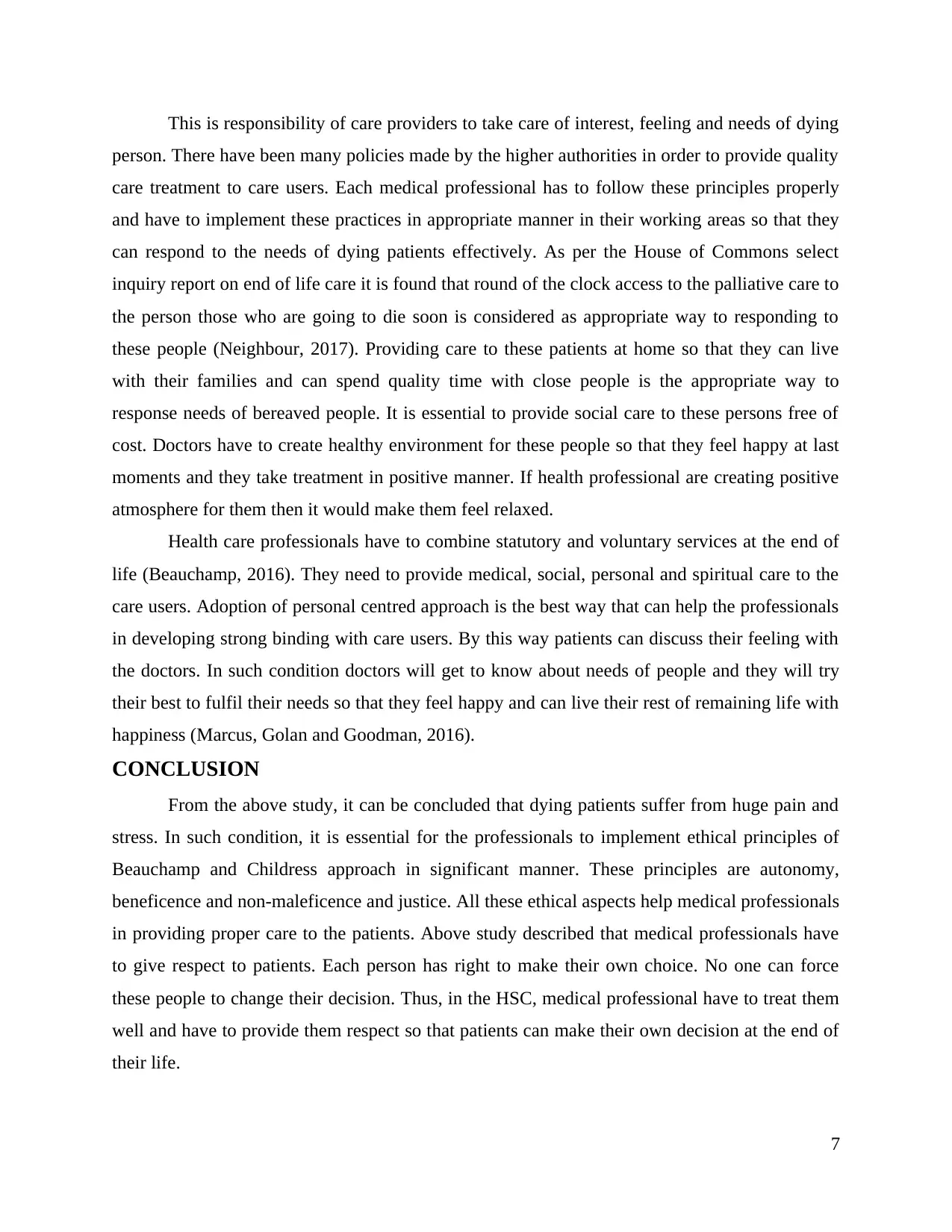
This is responsibility of care providers to take care of interest, feeling and needs of dying
person. There have been many policies made by the higher authorities in order to provide quality
care treatment to care users. Each medical professional has to follow these principles properly
and have to implement these practices in appropriate manner in their working areas so that they
can respond to the needs of dying patients effectively. As per the House of Commons select
inquiry report on end of life care it is found that round of the clock access to the palliative care to
the person those who are going to die soon is considered as appropriate way to responding to
these people (Neighbour, 2017). Providing care to these patients at home so that they can live
with their families and can spend quality time with close people is the appropriate way to
response needs of bereaved people. It is essential to provide social care to these persons free of
cost. Doctors have to create healthy environment for these people so that they feel happy at last
moments and they take treatment in positive manner. If health professional are creating positive
atmosphere for them then it would make them feel relaxed.
Health care professionals have to combine statutory and voluntary services at the end of
life (Beauchamp, 2016). They need to provide medical, social, personal and spiritual care to the
care users. Adoption of personal centred approach is the best way that can help the professionals
in developing strong binding with care users. By this way patients can discuss their feeling with
the doctors. In such condition doctors will get to know about needs of people and they will try
their best to fulfil their needs so that they feel happy and can live their rest of remaining life with
happiness (Marcus, Golan and Goodman, 2016).
CONCLUSION
From the above study, it can be concluded that dying patients suffer from huge pain and
stress. In such condition, it is essential for the professionals to implement ethical principles of
Beauchamp and Childress approach in significant manner. These principles are autonomy,
beneficence and non-maleficence and justice. All these ethical aspects help medical professionals
in providing proper care to the patients. Above study described that medical professionals have
to give respect to patients. Each person has right to make their own choice. No one can force
these people to change their decision. Thus, in the HSC, medical professional have to treat them
well and have to provide them respect so that patients can make their own decision at the end of
their life.
7
person. There have been many policies made by the higher authorities in order to provide quality
care treatment to care users. Each medical professional has to follow these principles properly
and have to implement these practices in appropriate manner in their working areas so that they
can respond to the needs of dying patients effectively. As per the House of Commons select
inquiry report on end of life care it is found that round of the clock access to the palliative care to
the person those who are going to die soon is considered as appropriate way to responding to
these people (Neighbour, 2017). Providing care to these patients at home so that they can live
with their families and can spend quality time with close people is the appropriate way to
response needs of bereaved people. It is essential to provide social care to these persons free of
cost. Doctors have to create healthy environment for these people so that they feel happy at last
moments and they take treatment in positive manner. If health professional are creating positive
atmosphere for them then it would make them feel relaxed.
Health care professionals have to combine statutory and voluntary services at the end of
life (Beauchamp, 2016). They need to provide medical, social, personal and spiritual care to the
care users. Adoption of personal centred approach is the best way that can help the professionals
in developing strong binding with care users. By this way patients can discuss their feeling with
the doctors. In such condition doctors will get to know about needs of people and they will try
their best to fulfil their needs so that they feel happy and can live their rest of remaining life with
happiness (Marcus, Golan and Goodman, 2016).
CONCLUSION
From the above study, it can be concluded that dying patients suffer from huge pain and
stress. In such condition, it is essential for the professionals to implement ethical principles of
Beauchamp and Childress approach in significant manner. These principles are autonomy,
beneficence and non-maleficence and justice. All these ethical aspects help medical professionals
in providing proper care to the patients. Above study described that medical professionals have
to give respect to patients. Each person has right to make their own choice. No one can force
these people to change their decision. Thus, in the HSC, medical professional have to treat them
well and have to provide them respect so that patients can make their own decision at the end of
their life.
7
⊘ This is a preview!⊘
Do you want full access?
Subscribe today to unlock all pages.

Trusted by 1+ million students worldwide
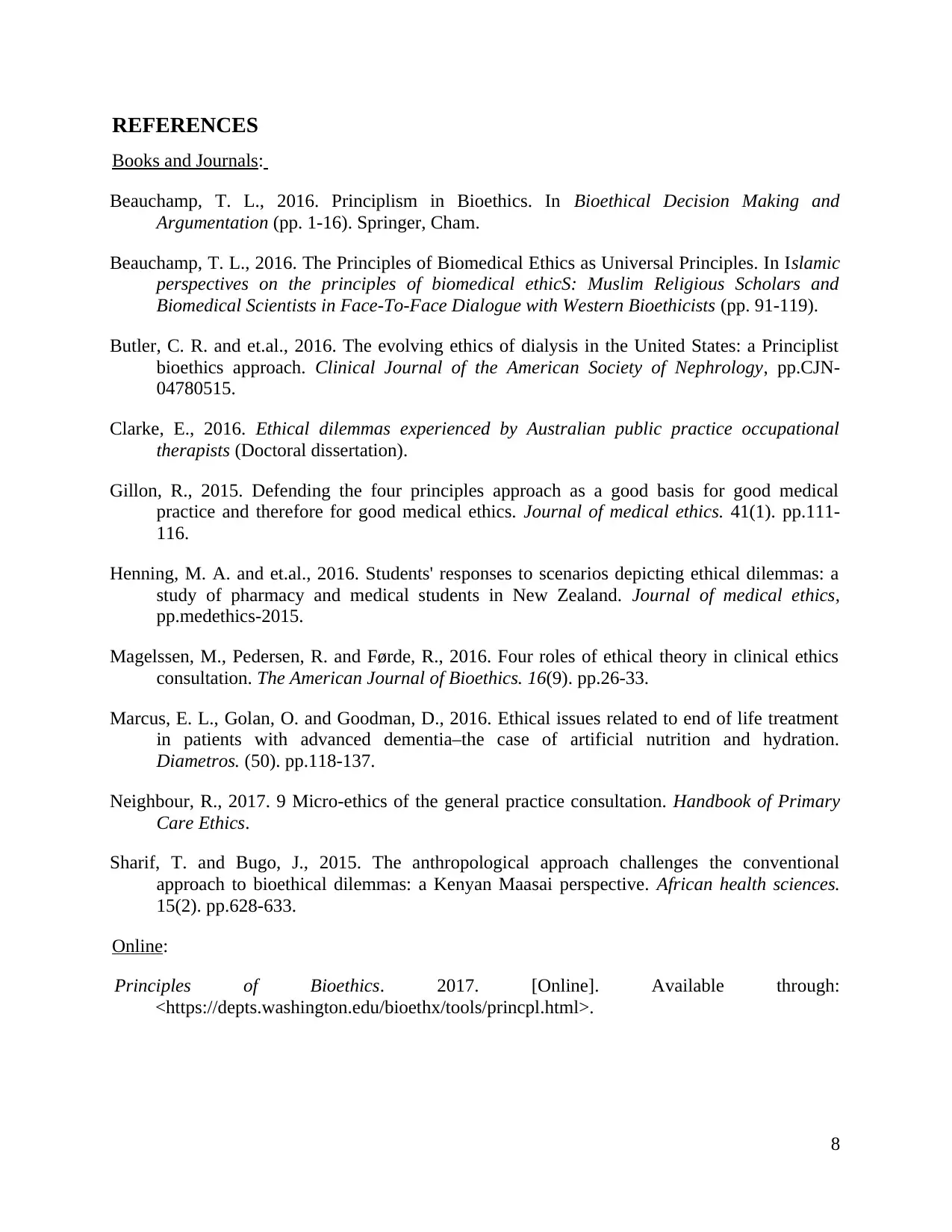
REFERENCES
Books and Journals:
Beauchamp, T. L., 2016. Principlism in Bioethics. In Bioethical Decision Making and
Argumentation (pp. 1-16). Springer, Cham.
Beauchamp, T. L., 2016. The Principles of Biomedical Ethics as Universal Principles. In Islamic
perspectives on the principles of biomedical ethicS: Muslim Religious Scholars and
Biomedical Scientists in Face-To-Face Dialogue with Western Bioethicists (pp. 91-119).
Butler, C. R. and et.al., 2016. The evolving ethics of dialysis in the United States: a Principlist
bioethics approach. Clinical Journal of the American Society of Nephrology, pp.CJN-
04780515.
Clarke, E., 2016. Ethical dilemmas experienced by Australian public practice occupational
therapists (Doctoral dissertation).
Gillon, R., 2015. Defending the four principles approach as a good basis for good medical
practice and therefore for good medical ethics. Journal of medical ethics. 41(1). pp.111-
116.
Henning, M. A. and et.al., 2016. Students' responses to scenarios depicting ethical dilemmas: a
study of pharmacy and medical students in New Zealand. Journal of medical ethics,
pp.medethics-2015.
Magelssen, M., Pedersen, R. and Førde, R., 2016. Four roles of ethical theory in clinical ethics
consultation. The American Journal of Bioethics. 16(9). pp.26-33.
Marcus, E. L., Golan, O. and Goodman, D., 2016. Ethical issues related to end of life treatment
in patients with advanced dementia–the case of artificial nutrition and hydration.
Diametros. (50). pp.118-137.
Neighbour, R., 2017. 9 Micro-ethics of the general practice consultation. Handbook of Primary
Care Ethics.
Sharif, T. and Bugo, J., 2015. The anthropological approach challenges the conventional
approach to bioethical dilemmas: a Kenyan Maasai perspective. African health sciences.
15(2). pp.628-633.
Online:
Principles of Bioethics. 2017. [Online]. Available through:
<https://depts.washington.edu/bioethx/tools/princpl.html>.
8
Books and Journals:
Beauchamp, T. L., 2016. Principlism in Bioethics. In Bioethical Decision Making and
Argumentation (pp. 1-16). Springer, Cham.
Beauchamp, T. L., 2016. The Principles of Biomedical Ethics as Universal Principles. In Islamic
perspectives on the principles of biomedical ethicS: Muslim Religious Scholars and
Biomedical Scientists in Face-To-Face Dialogue with Western Bioethicists (pp. 91-119).
Butler, C. R. and et.al., 2016. The evolving ethics of dialysis in the United States: a Principlist
bioethics approach. Clinical Journal of the American Society of Nephrology, pp.CJN-
04780515.
Clarke, E., 2016. Ethical dilemmas experienced by Australian public practice occupational
therapists (Doctoral dissertation).
Gillon, R., 2015. Defending the four principles approach as a good basis for good medical
practice and therefore for good medical ethics. Journal of medical ethics. 41(1). pp.111-
116.
Henning, M. A. and et.al., 2016. Students' responses to scenarios depicting ethical dilemmas: a
study of pharmacy and medical students in New Zealand. Journal of medical ethics,
pp.medethics-2015.
Magelssen, M., Pedersen, R. and Førde, R., 2016. Four roles of ethical theory in clinical ethics
consultation. The American Journal of Bioethics. 16(9). pp.26-33.
Marcus, E. L., Golan, O. and Goodman, D., 2016. Ethical issues related to end of life treatment
in patients with advanced dementia–the case of artificial nutrition and hydration.
Diametros. (50). pp.118-137.
Neighbour, R., 2017. 9 Micro-ethics of the general practice consultation. Handbook of Primary
Care Ethics.
Sharif, T. and Bugo, J., 2015. The anthropological approach challenges the conventional
approach to bioethical dilemmas: a Kenyan Maasai perspective. African health sciences.
15(2). pp.628-633.
Online:
Principles of Bioethics. 2017. [Online]. Available through:
<https://depts.washington.edu/bioethx/tools/princpl.html>.
8
1 out of 10
Related Documents
Your All-in-One AI-Powered Toolkit for Academic Success.
+13062052269
info@desklib.com
Available 24*7 on WhatsApp / Email
![[object Object]](/_next/static/media/star-bottom.7253800d.svg)
Unlock your academic potential
Copyright © 2020–2025 A2Z Services. All Rights Reserved. Developed and managed by ZUCOL.





